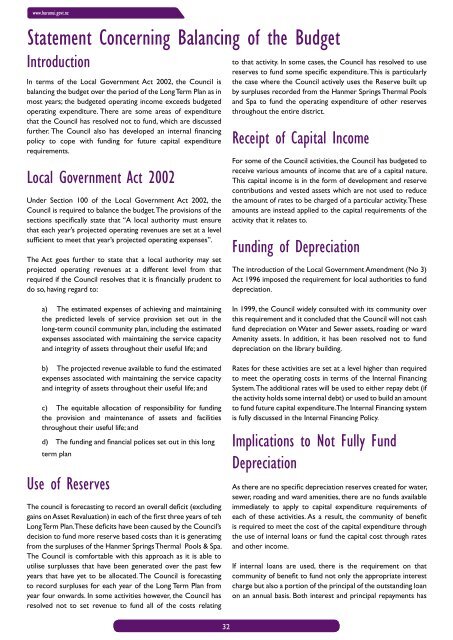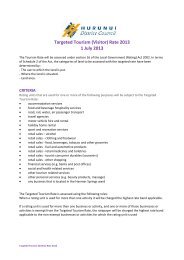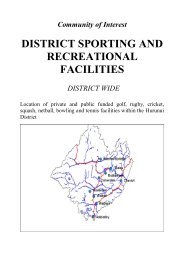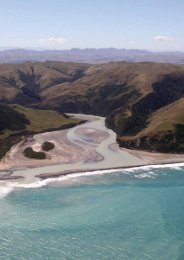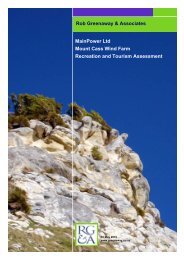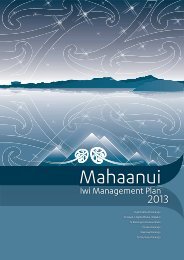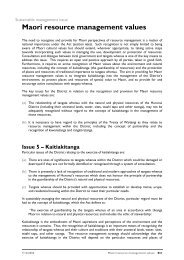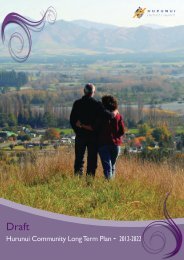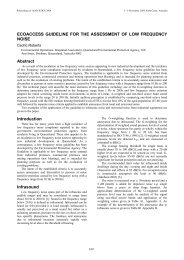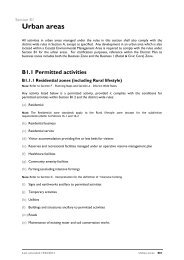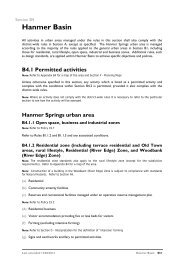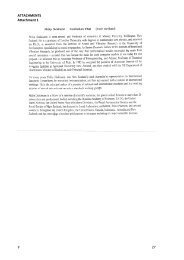LTP 2012-2022 - Introduction - Hurunui District Council
LTP 2012-2022 - Introduction - Hurunui District Council
LTP 2012-2022 - Introduction - Hurunui District Council
You also want an ePaper? Increase the reach of your titles
YUMPU automatically turns print PDFs into web optimized ePapers that Google loves.
www.hurunui.govt.nz<br />
Statement Concerning Balancing of the Budget<br />
<strong>Introduction</strong><br />
In terms of the Local Government Act 2002, the <strong>Council</strong> is<br />
balancing the budget over the period of the Long Term Plan as in<br />
most years; the budgeted operating income exceeds budgeted<br />
operating expenditure. There are some areas of expenditure<br />
that the <strong>Council</strong> has resolved not to fund, which are discussed<br />
further. The <strong>Council</strong> also has developed an internal financing<br />
policy to cope with funding for future capital expenditure<br />
requirements.<br />
Local Government Act 2002<br />
Under Section 100 of the Local Government Act 2002, the<br />
<strong>Council</strong> is required to balance the budget. The provisions of the<br />
sections specifically state that “A local authority must ensure<br />
that each year’s projected operating revenues are set at a level<br />
sufficient to meet that year’s projected operating expenses”.<br />
The Act goes further to state that a local authority may set<br />
projected operating revenues at a different level from that<br />
required if the <strong>Council</strong> resolves that it is financially prudent to<br />
do so, having regard to:<br />
to that activity. In some cases, the <strong>Council</strong> has resolved to use<br />
reserves to fund some specific expenditure. This is particularly<br />
the case where the <strong>Council</strong> actively uses the Reserve built up<br />
by surpluses recorded from the Hanmer Springs Thermal Pools<br />
and Spa to fund the operating expenditure of other reserves<br />
throughout the entire district.<br />
Receipt of Capital Income<br />
For some of the <strong>Council</strong> activities, the <strong>Council</strong> has budgeted to<br />
receive various amounts of income that are of a capital nature.<br />
This capital income is in the form of development and reserve<br />
contributions and vested assets which are not used to reduce<br />
the amount of rates to be charged of a particular activity. These<br />
amounts are instead applied to the capital requirements of the<br />
activity that it relates to.<br />
Funding of Depreciation<br />
The introduction of the Local Government Amendment (No 3)<br />
Act 1996 imposed the requirement for local authorities to fund<br />
depreciation.<br />
a) The estimated expenses of achieving and maintaining<br />
the predicted levels of service provision set out in the<br />
long-term council community plan, including the estimated<br />
expenses associated with maintaining the service capacity<br />
and integrity of assets throughout their useful life; and<br />
b) The projected revenue available to fund the estimated<br />
expenses associated with maintaining the service capacity<br />
and integrity of assets throughout their useful life; and<br />
c) The equitable allocation of responsibility for funding<br />
the provision and maintenance of assets and facilities<br />
throughout their useful life; and<br />
d) The funding and financial polices set out in this long<br />
term plan<br />
Use of Reserves<br />
The council is forecasting to record an overall deficit (excluding<br />
gains on Asset Revaluation) in each of the first three years of teh<br />
Long Term Plan. These deficits have been caused by the <strong>Council</strong>’s<br />
decision to fund more reserve based costs than it is generatimg<br />
from the surpluses of the Hanmer Springs Thermal Pools & Spa.<br />
The <strong>Council</strong> is comfortable with this approach as it is able to<br />
utilise surplusses that have been generated over the past few<br />
years that have yet to be allocated. The <strong>Council</strong> is forecasting<br />
to record surpluses for each year of the Long Term Plan from<br />
year four onwards. In some activities however, the <strong>Council</strong> has<br />
resolved not to set revenue to fund all of the costs relating<br />
In 1999, the <strong>Council</strong> widely consulted with its community over<br />
this requirement and it concluded that the <strong>Council</strong> will not cash<br />
fund depreciation on Water and Sewer assets, roading or ward<br />
Amenity assets. In addition, it has been resolved not to fund<br />
depreciation on the library building.<br />
Rates for these activities are set at a level higher than required<br />
to meet the operating costs in terms of the Internal Financing<br />
System. The additional rates will be used to either repay debt (if<br />
the activity holds some internal debt) or used to build an amount<br />
to fund future capital expenditure. The Internal Financing system<br />
is fully discussed in the Internal Financing Policy.<br />
Implications to Not Fully Fund<br />
Depreciation<br />
As there are no specific depreciation reserves created for water,<br />
sewer, roading and ward amenities, there are no funds available<br />
immediately to apply to capital expenditure requirements of<br />
each of these activities. As a result, the community of benefit<br />
is required to meet the cost of the capital expenditure through<br />
the use of internal loans or fund the capital cost through rates<br />
and other income.<br />
If internal loans are used, there is the requirement on that<br />
community of benefit to fund not only the appropriate interest<br />
charge but also a portion of the principal of the outstanding loan<br />
on an annual basis. Both interest and principal repayments has<br />
32


